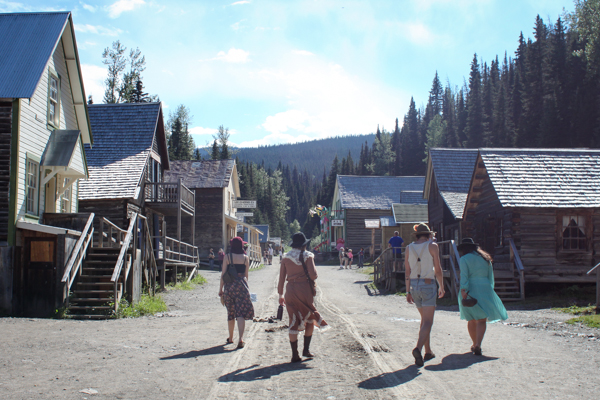Jessa & Ariel
Two local artists share how the powder-filled terrain of BC ski resorts helps them create more than just fresh lines.



I have always been a big fan of British Columbia’s historic towns. While I’ve visited Fort Steele, Hat Creek Ranch and O’Keefe Ranch, I had never made it to Barkerville, a well preserved gold rush town with more than 100 still standing heritage structures. This year I decided to attend Artswells, a music and art festival in tiny Wells, which, luckily for me, is a very short drive to Barkerville. It’s worth noting that with an Artswells festival wristband, entrance to Barkerville is only $5!


At first glance, Barkerville is a long strip of wooden buildings, ranging from homes to businesses and even a Chinatown, which happens to be the largest collection of pre-railway Chinese buildings in North America. A short walk away are cemeteries, old mining tracts and the court house, where I personally hoped to meet “Hanging” Judge Begbie, one of the most fascinating personalities in BC’s history. The buildings are in incredible shape, carefully restored with great attention to historic detail. One could spend hours just peering into windows, examining the thoughtfully arranged contents of shops and offices and homes.



Upon entry, we were presented with a long list of daily scheduled events, ranging from Chinese lessons in the Chinatown school, stagecoach rides, guided town tours and vibrant performances at the Theatre Royal. Our group enjoyed listening to the costumed interpreters the most. One gentleman named Casper spoke at length about his job as a government assayer—a dry subject, but to be honest, we were rather distracted by how handsome he looked in his period clothing! We popped into a lavishly decorated home, with rich wallpaper, fine china settings and a furry bearskin rug on the parlour wall, and were greeted by the friendly mistress of the house, who spends her day baking delicious treats in the fully functional kitchen. She brought out an enormous, awkward sled-like backpack for my friend to try on, explaining it was used by early loggers in the area. By the time he hoisted it onto his back, with assistance, we were marveling at the endurance required for carrying the pack. Even though we were standing in a relatively luxurious and comfortable dwelling, life in Barkerville couldn’t have been easy.



My favourite place in Barkerville was a second-floor space in an unassuming building. Inside were the remains of a boarding house, relatively untouched since its last use in the 1930s. It had been purposely half restored, allowing visitors to see the effects of time on the faded wallpaper, threadbare rugs and scuffed furnishings, and providing a fascinating and somewhat eerie glimpse into the final days of Barkerville’s mining boom.


I loved strolling the boardwalks of Barkerville, imagining the rough but vivid characters who made their lives at the end of the Cariboo Wagon Road. One could easily spend multiple days taking in the sights, daily activities and indulging in some local cuisine as well (the Long Duck Tong Chinese restaurant comes highly recommended). Most important of all, don’t forget to stop at Frank J. McMahon’s Confectionary—the rock candy is well worth its weight in gold.